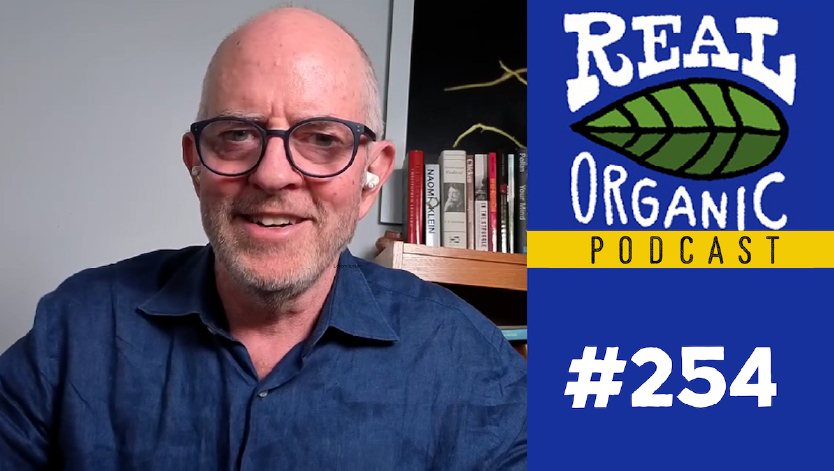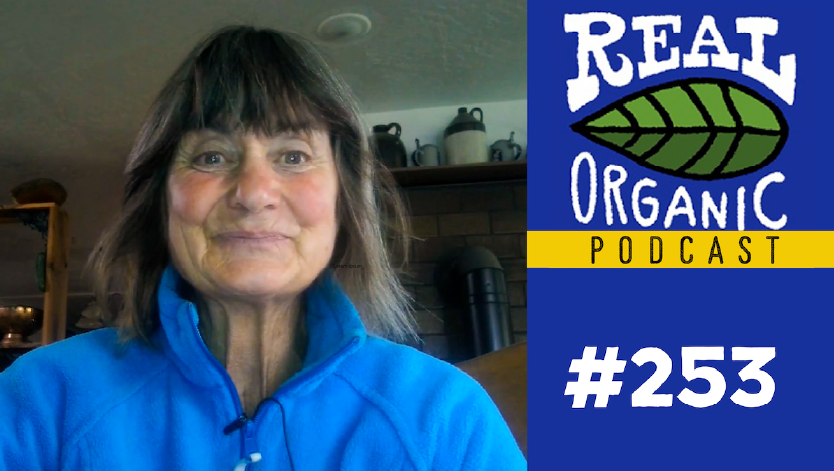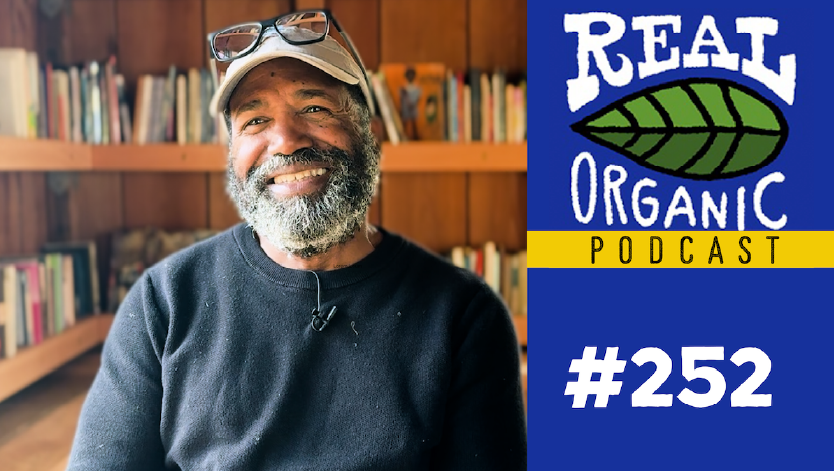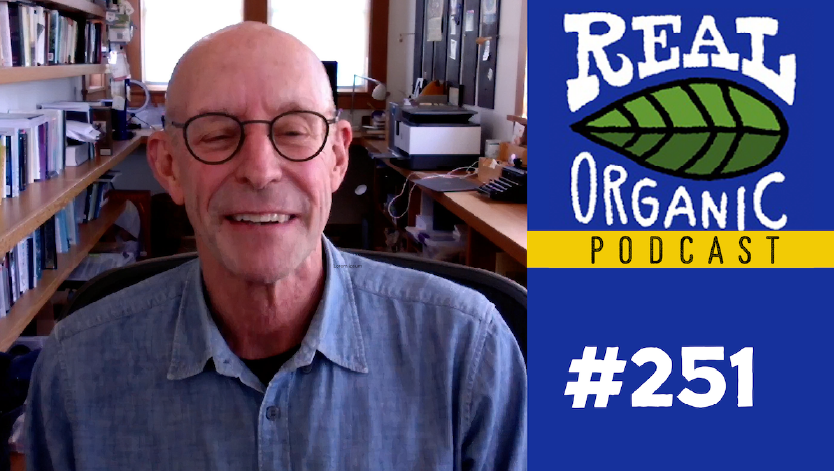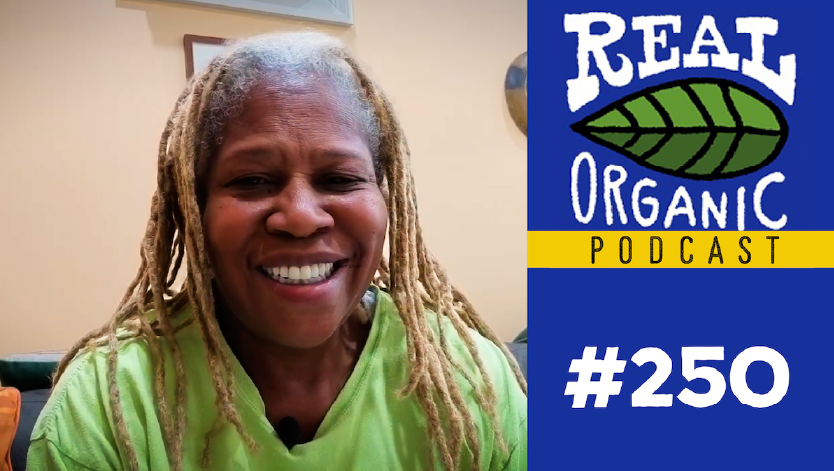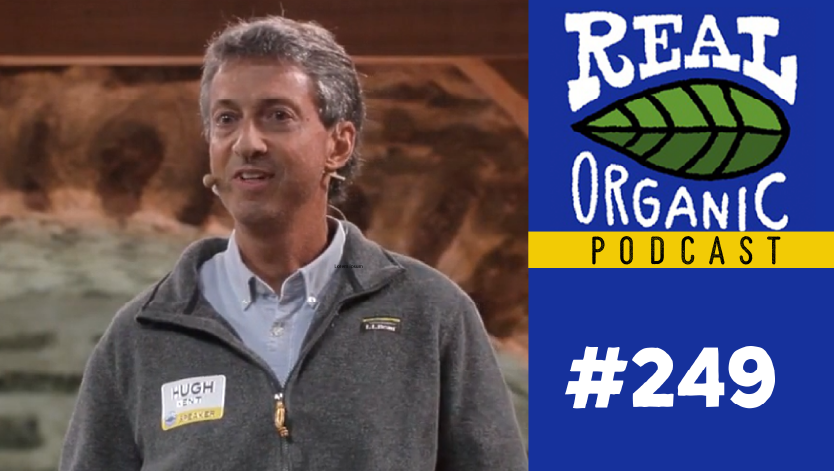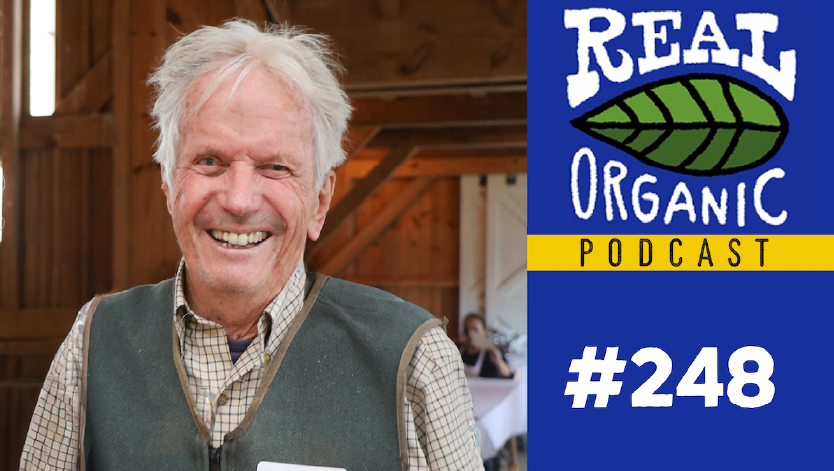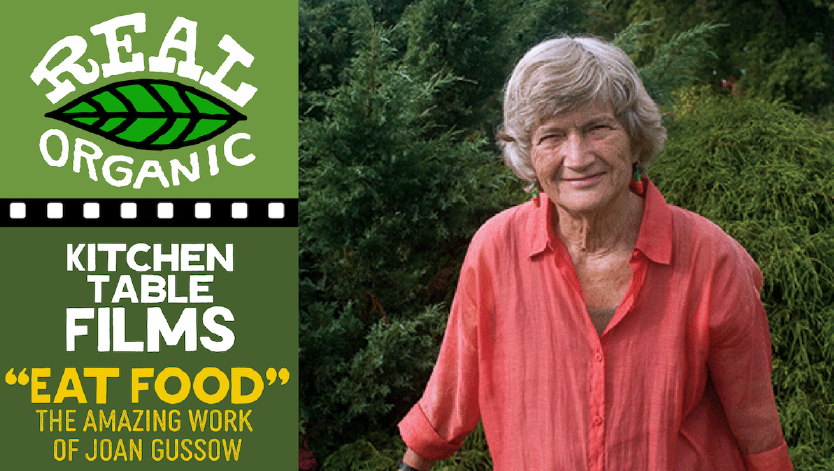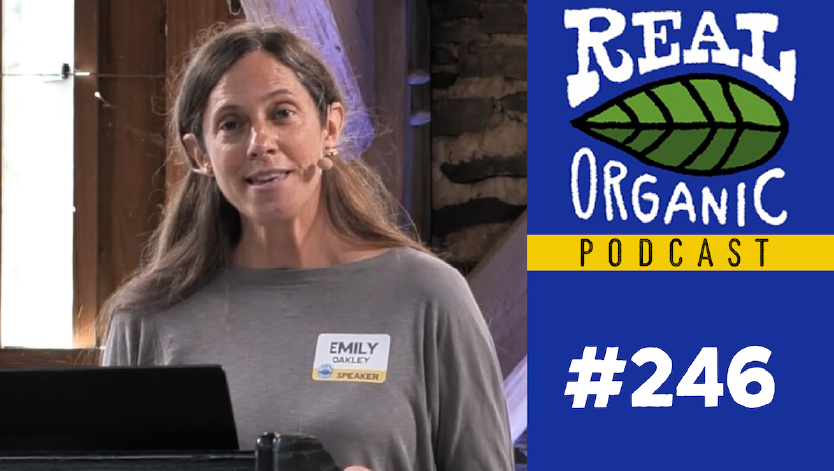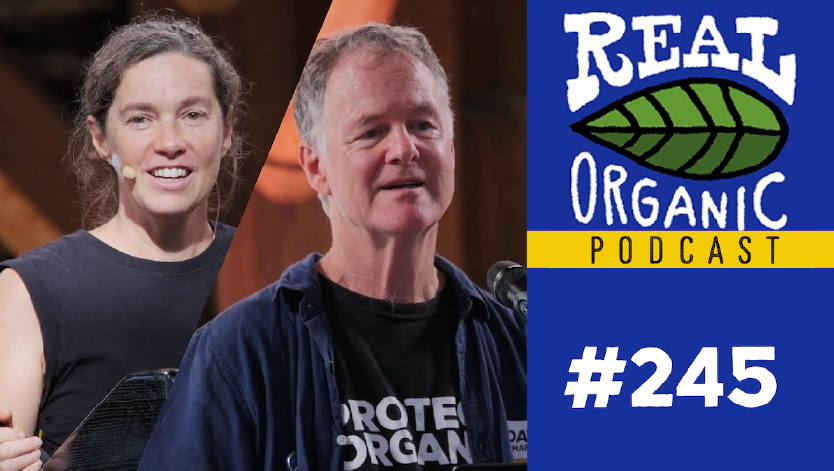Episode #242
Abby Rockefeller: Sewage Sludge Activist
Abby Rockefeller has spent decades challenging one of the least-discussed threats to our food system: sewage sludge. While regulators and corporations promote “biosolids” as safe fertilizer, Abby reveals the hidden dangers of spreading toxic waste on farmland – from PFAS contamination to sick cows and polluted soils. In this conversation, she shares the history of compost toilets, her early battles with regulators, and why real solutions to waste must start with rethinking how we handle our most basic human outputs.
Our Abby Rockefeller interview has been edited and condensed for clarity:
You can subscribe and download episodes of our show through your favorite podcast app, our YouTube channel, or stream the audio-only version here:
Dave Chapman interviews Abby Rockefeller, August 2025:
Chris Mackin 0:05
[background conversations]
Abby Rockefeller 0:20
Listen, it makes sense to say, how come I came to know about all this. I came to know about it because I wanted a toilet next to my garden out there. My upper garden was the one I had. I had built that house, which is right out there, and I wanted a toilet that I could use so that I wouldn’t run back… I’d gotten an awareness that it was ridiculous to run back to the house and urinate and defecate into drinking water. It just didn’t feel right to me. It didn’t feel good.
Abby Rockefeller 0:59
I was in the process of trying to design something that would give me it all back to use in my garden. The EPA was already saying “You cannot use human waste in agriculture at all.” Even now they do this, as long as you mix it with all the chemicals, then you can use it. But by itself, no. You can’t do that.
Abby Rockefeller 1:26
I was in the middle of trying to design something then, which is 1971 or 1972, and lo and behold, Rodale Press put out one their little boring journals, which would just say the same thing every single month. It was a monthly journal I read. I would read them, and they were always the same, but they were fun if you were doing organic gardening.
Abby Rockefeller 1:59
They had, amazingly, Richard Linsley-Hood with his own little hand drawing. He was an artist himself, and he had made a drawing of his tank, which was made originally out of concrete blocks. That’s the first one he made. But then he made one out of fiberglass, and it looked like a big shoe sitting on its toe.
Abby Rockefeller 2:21
It’s called Clivus Multrum. It was the first compost toilet that produced compost, specifically in, I think, I don’t know, in the world but certainly in this country. I was astonished, but I didn’t like to fly. I still don’t like to fly. I had two friends. They used to be together, but then they were separated, so they were going to Europe separately. I asked them both to go to Sweden and smell it.
Abby Rockefeller 2:57
I was like everybody, I wanted to know, “Did it smell in the bathroom?” Well, it doesn’t, because it has a fan. There is a smell in the stuff, but it has a fan that takes air down the toilet and up a ventilation system. Anyway, they went, and they both had the report: “It doesn’t smell.” That means either in the bathroom, or the stuff that comes out of it doesn’t smell.
Dave Chapman 3:25
Let’s pause for a moment.
Abby Rockefeller 3:28
Okay, all right.
Dave Chapman 3:29
We’re back again.
Abby Rockefeller 3:32
I asked these two friends to go and check it out. They had good reports. Then I had two other friends: I had a boyfriend who I was trying to get rid of, and I had a woman friend who I was also trying to get rid of. So, I set them up to go together. They had a car accident in England because they were driving on the wrong side of the road. Anyway, they went and met Karl Lindström’s family and said it was amazing.
Dave Chapman 4:12
Give me a give me a year, Abby.
Abby Rockefeller 4:13
1972 was that year. It was the summer…
Chris Mackin 4:19
This was before you met Karl, you [inaudible 4:19] that work.
Abby Rockefeller 4:20
Yeah, that’s right. That was before I met Karl. I then went and got on a plane, which was a nightmare. I had the flu because I was going to go on the plane, so I got the flu. It was a horrible trip. I went over myself to see it and was bowled over.
Abby Rockefeller 4:43
It’s a big tank, and it looks like a shoe sitting on the toe, and all of that is of significance. But Richard didn’t get it, actually. He thought that the slope was for the solids, but the slope is actually serving an amazing function for the urine. It took us 15 years of working with this in this country with Karl Lindström, who I got together with, and we worked together for a long time.
Abby Rockefeller 5:21
The piece that his father did not know is that the urine doesn’t decompose; it does what’s called nitrify. Nitrification is the process which, across the surface of the Earth, everywhere happens when urine is deposited on the soil.
Abby Rockefeller 5:43
The bacteria that do the nitrification are two species of the same genus. It’s Nitrosomonas and Nitrobacter, and they each do one of the pieces. Urea turns to ammonia nitrogen, ammonia nitrogen turns to nitrite, and nitrite turns to nitrate in just a few inches of soil.
Abby Rockefeller 6:06
I suspect, I have not tested it, but I think there’s probably no smell. The urea has already been tied down and transformed in just a few inches, and it’s ready for plants. That’s the system of the great nitrogen producer of the Earth.
Abby Rockefeller 6:29
So, I got involved. I bought two myself, and I brought 10 over to this country. Helen and Scott Nearing took one, Peter Segger took another. It was amazing. They were good people who believed in them. Peter Segger was wonderful. He was such a great…
Dave Chapman 6:50
And they were really happy?
Abby Rockefeller 6:51
Yeah.
Dave Chapman 6:52
That’s great.
Abby Rockefeller 6:53
They believed in it. But there was such work to be done, and there’s still such work, because this country doesn’t… The secret forces behind the whole system of using water to carry sewage waste, to carry all our waste – whatever can be carried in the water is carried in the water. Anyway, I then came to be aware, because of living with this. I had put one in my house in Cambridge, which I was fixing up, and one in this house.
Dave Chapman 7:33
The big innovation here, Abby, is that unlike an outhouse, this didn’t smell like manure.
Abby Rockefeller 7:44
I think what we call manure, which is horse manure and cow manure, smells wonderful, but human manure doesn’t smell great. We don’t like it. We don’t like the smell of outhouses. It needs to be in a place where it can actually decompose, and it needs time.
Abby Rockefeller 8:04
This tank, which is pretty big – the original was eight feet long and five feet high – was a big thing to put in there. So, around stairs under the toilet over there, and it has been going since 1972. So, how did I get to the sludge in the…?
Abby Rockefeller 8:32
…the water is taking everything away.
Abby Rockefeller 8:37
I didn’t want to use water that way. Then we built that greenhouse, because then we had what’s called gray water, which is wash water, and it’s perfect for irrigating plants because it doesn’t have too much nitrogen. The nitrogen in the urine is too much.
Abby Rockefeller 8:55
You can make dead spots in the grass, which I have out there because somebody’s dog used it too much in one place or something like that. I don’t know. It’s strong stuff, and it has to be converted to its usable form, which is what happens. But we don’t want to either use an outhouse – we don’t want to go out of the house – we want to be able to be in the house, which I did, certainly, and we wanted it to not smell.
Abby Rockefeller 9:25
And this satisfied all those things. So, it got me into the world of… I made a company in two years. I’d lived with it for two years. I thought, “I’ve got to make this thing.” That was a piece of work. That was great.
Abby Rockefeller 8:54
I remember reading about it in the Whole Earth Catalog.
Abby Rockefeller 9:53
Yes, I know. It was in the Whole Earth Catalog. Hippies all wanted it, but it wasn’t… It was a big thing. It was a big expense. The sanitary engineers, as they are called, and the sewer world, the way they keep this from going anywhere is by making regulations so that you have to have a complete septic system, even if you have a compost toilet or stuff like that. People are mostly not going to do it.
Abby Rockefeller 10:16
Until we change the laws, until we recognize that the sewer system is by far the greatest mechanism of water pollution and water destruction in the world – sewers. The thing that was called the Clean Water Act was a sewering act. It wasn’t a Clean Water Act. You don’t make clean water with sewers. You destroy the water with sewers, because you invite everything to be put in.
Abby Rockefeller 10:46
It’s worse than a septic tank. Septic tanks are not good because they’re not designed to get the stuff back. You put it under the ground, and it goes into the groundwater at the worst. Some trees will take up some of the nutrients, but essentially, it’s a disposal system. That’s what we have – disposal. We don’t understand the cycles of life. We don’t want to participate in them.
Dave Chapman 11:15
Is the biggest challenge of the sewage system that it’s mixing in all these chemicals with the poop?
Abby Rockefeller 11:27
Yes. The biggest horror is that it is an invitation to any industry, on every manhole and all the openings to the sewers in the streets, with the gasoline, everything, hospital waste, everything that can be put down a toilet or down a sink goes into the sewer system.
Abby Rockefeller 11:49
The industrial world gets free disposal of their wastes. I believe that is a crime. They should not be allowed to dispose of their waste. I believe we need to come to a point – and I don’t know if we’ll be able to – where we say, “You can’t make that thing if you can’t manage its so-called waste products.”
Abby Rockefeller 12:17
That should be a given, but people are far away from thinking in those terms. I think that the industries have been used to getting free disposal. We, the taxpayers, pay for that.
Dave Chapman 12:32
Even then it’s not free. Even after we pay for it, there’s a problem.
Abby Rockefeller 12:36
Of course, that’s right.
Dave Chapman 12:37
Let’s talk about that problem.
Abby Rockefeller 12:40
The problem is that it produces an unusable material, because everything that any municipality puts down its sinks, toilets, and its industrial drains is in there, and you can’t get it out. You can’t separate the stuff. There’s no such thing as serious treatment. All the talk about treating sewage is nonsense.
Abby Rockefeller 13:10
All they’re doing is… What are they doing? Primary treatment was screening. I say they screened out dead cats and turds that held together. That’s what they could screen out, and everything else would go to the water. So, that’s the deal. The soluble stuff goes to the water, and the insoluble stuff is what you take out.
Abby Rockefeller 13:35
Then the so-called Clean Water Act said, “We need secondary treatment.” Secondary treatment is a preposterous concept. They force oxygen into the sewage, into a huge basin. That’s what you see, the bubbling with a bubble, at an unbelievable cost – energy. A huge amount of energy is used to keep aerobic bacteria operating in that water. It’s inevitably naturally anaerobic. It would be anaerobic.
Abby Rockefeller 14:24
To jump, I think anaerobic digestion of the raw, primary-treated sewage sludge is what should be done, and that’s all – just to reduce the volume. It should be treated as a hazardous waste, because that’s all it is, and it should be isolated until we grow up and decide to do something that makes sense of our excreta.
Dave Chapman 14:52
When they’re doing the aerobic digestion…
Abby Rockefeller 14:55
The aerobic, so-called treatment – digestion.
Dave Chapman 14:58
…does that break down the harmful microbes?
Abby Rockefeller 15:04
No, they’re not concerned about the harmful microbes. It breaks down the organic stuff in it. The bacteria probably take in tons of the chemicals; they can live with them, so they become toxic. It produces a material that’s more organic. I think it does something like triple the actual volume of the sludge, which is because the bacteria grow. They grow and grow and grow.
Abby Rockefeller 15:38
They can do it; they know how to do it if you provide them with oxygen, but it takes incredible energy to keep oxygen in highly nutritious water. It is nutritious because the feces are full of nutrients. That’s what the Earth depends on.
Dave Chapman 16:00
So, there’s lots of organic matter there, ready to feed the microbes as long as you keep it aerobic.
Abby Rockefeller 16:08
There’s tons of organic matter ready to feed the microbes as long as you keep it aerobic, at this huge, insane cost. It’s just ridiculous.
Dave Chapman 16:13
Then they separate the water from the solids.
Abby Rockefeller 16:18
Whatever is soluble goes with the water. The sludge is a jelly, it is not dehydrated. They can’t do that. They talk about it, but they can’t do that. It’s the same old thing: what goes to the water is what’s soluble, and what stays with the sludge is insoluble.
Dave Chapman 16:44
One of the goals of the Clean Water Act was to reclaim the water from this process.
Abby Rockefeller 16:51
I don’t even know. They’re not recovering it. It’s just that they take a certain amount of the fecal matter out, probably. Again, I don’t know what proportion of the chemicals they can get out that are insoluble, that will go with the solids instead of the water. It’s terrible water that goes out into the ocean everywhere where sewers are dumped. They’re dumping pollution. They’re dumping toxic effluent. It’s all toxic.
Dave Chapman 17:29
And they’re left over with this…
Abby Rockefeller 17:31
Then they have this terrible problem of the sewage sludge, which they would landfill. I say that’s all they can do. They need to have lined landfills as the only thing. But they don’t want to do it because towns don’t like it, it’s expensive, and this and that. Now they’ve formed this clever plan – they will land-apply it.
Abby Rockefeller 18:00
That term “apply” sounds a little chemical, it sounds medical. You apply medicines, right? They don’t say you spread it. I say that they unconsciously know they don’t have a good thing here. We spread manure and fertilizer. We don’t apply fertilizer and manure. They’ve got this special word: “You apply this.”
Dave Chapman 18:26
They’re taking this and spreading it on our farmlands.
Abby Rockefeller 18:30
Yes, right. They were the first thing they did. Years ago, I had a big thing in this town here in Webster, New Hampshire. There was a guy who they paid for his lime. They used to pay people. They’d pay for your lime. They’d lime your fields if you would take the sewage sludge. He was taking it, and he was having really sick cows.
Abby Rockefeller 18:56
I got a group together, and we had a huge town meeting, and CNN came and filmed it. I’m sure it’s available, but I’ve never seen it.
Dave Chapman 18:55
I’d like to see it.
Abby Rockefeller 19:09
Yeah, that was a long time ago. That was the early ’90s. Let’s see. Where am I?
Dave Chapman 19:23
There was a spirited public conversation about whether or not this would be permitted.
Abby Rockefeller 19:30
In that meeting we voted vastly to not permit it. This farmer felt he was being discriminated against because he’s a poor guy. They were telling him it’s fertilizer, it was going to fertilize his land. He was going to get free fertilizer.
Abby Rockefeller 19:53
A piece of all this that I did not know is that, in fact, the town could have refused to go against it, because the industries have personhood rights, and have had personhood rights since the 14th Amendment. The personhood right says you can’t discriminate against an industry as a person.
Abby Rockefeller 19:37
So, they can come to town with whatever they have and you can’t say no, because they are a person. That was a whole other piece of understanding that I came into through what was called the CELDF, the Community Environmental Legal Defense Fund. There was also a guy who started something called POCLAD. Do you remember that, POCLAD?
Chris Mackin 19:37
Yeah.
Abby Rockefeller 19:37
That was Richard Grossman, and he decided to learn, and it turned out Lee had told me already he had learned from his history teacher that the 14th Amendment guaranteed personhood rights to corporations. Corporations were persons under the law way before so-called… what’s it called?
Dave Chapman 21:03
Citizens United.
Abby Rockefeller 21:07
Citizens United. Oh, that’s nonsense. That’s the last nail in that coffin. Plenty of towns have tried to keep the sewage sludge out and have failed.
Dave Chapman 21:26
Failed in the court.
Abby Rockefeller 21:27
Failed in the court, that’s right.
Dave Chapman 21:28
I don’t want to jump the gun, but of course, we’ve come to the understanding – “we” being many, many people now, most of whom have never seen a farm in their lives – that sewage sludge is making the farmers’ animals sick and the crops sick that are being sold. As it’s being discovered on a large scale, it’s pretty horrendous. You’ve got this land polluted forever.
Abby Rockefeller 22:02
It is preposterous. It’s an outrage. Unfortunately, they focus on things like PFAS. Everything in it has been ruined by everything else. There’s good stuff in it. The feces and urine are the best stuff, but that’s not kept separate.
Dave Chapman 22:26
As you said, if you were to just take an outhouse and spread the feces and urine on the field, that would be illegal.
Abby Rockefeller 22:31
It’s absolutely illegal.
Dave Chapman 22:36
But if you put it and blend it with a thousand toxic chemicals…
Abby Rockefeller 22:42
Then all of a sudden they’ve decided it’s legal, just because they can. We had the first anti-sludge conference in Concord, New Hampshire in the early to mid-’90s. That was good, but we didn’t really get anywhere with it. Then I worked with a friend at EPA, Hugh Kaufman, who was a good fighter. He was the one who fought the Love Canal thing. Remember that?
Dave Chapman 23:26
Yeah.
Abby Rockefeller 23:27
He was the good guy in EPA. There was a big meeting put on by EPA up here, and I was at that, and we tried to talk. It was essentially impossible. They had the power, the interest, and the will. Now there’s a different situation, because people are really scared of what is going to happen. There’s a chance to do something, but it’s not a good thing.
Abby Rockefeller 24:06
The fact is, we have to back off the sewers. That’s what we have to do. We’ve got to get industry off, and we should be off. We need to figure out how to conserve and husband our own excreta. We have to do that. Once we do that, we will think better of it.
Abby Rockefeller 24:38
We have negative views of our own excreta because we do wrong with it. We harm the water – we destroy the water with it and everything else. The word “shit” is a negative word because we have done wrong with it. That’s all. It’s the only reason.
Dave Chapman 25:02
It’s intimately tied, Abby, of course, with the chemical pollution. There are almost two issues, but they become one issue with sewage sludge.
Abby Rockefeller 25:12
Absolutely. This is the “get rid of it” system that we have. They pipe the sewage effluent 10 miles out of Boston Harbor from the sewage treatment plant at Deer Island, where there used to be a prison. I think that prison is gone.
Abby Rockefeller 25:35
They pipe it 10 miles out to sea, and it happens to be the feeding grounds of the humpback whales. What it does to their feeding… They are one of the whales with baleen, the screen they use to take in tiny creatures.
Dave Chapman 26:07
Right, which, unfortunately, the sludge would just be taken in.
Abby Rockefeller 26:13
Right. It’s an immense thing to face, and it’s got many pieces to it. The first piece is that people should not tie into sewers. People are pushed into that. Bechtel has been the big behind-the-scenes promoter. Nobody ever talks to Bechtel.
Abby Rockefeller 26:42
The sanitary engineers, people in EPA, and all the state and local agencies – whatever they’re called – are the ones who push people and say, “Well, your septic system isn’t working anymore,” etc. Septic systems, as I said, are not as bad. At least they’re local. You’re not destroying the water, except in so far as it goes to groundwater, but it’s nothing compared to the sewers.
Dave Chapman 27:14
It’s a problem where, of course, when you are in an urban environment, you really have no choice.
Abby Rockefeller 27:20
The way things are, in my view, we could have anaerobic digesters in the basements of big buildings and have the toilet stuff go there, just to keep that stuff out of the sewers. Then industry has to be ordered to take care of their own.
Dave Chapman 27:47
Which requires a government regulation.
Abby Rockefeller 27:48
Which requires a different kind of government regulation. That’s right. I don’t know what kind.
Chris Mackin 27:58
Something’s happened just in the last couple of years where “the chickens have come home to roost,” so to speak, in terms of the biosolids and the evidence of what they do…
Abby Rockefeller 28:11
Don’t call them biosolids.
Chris Mackin 28:11
That’s the PR term.
Abby Rockefeller 28:12
That’s right. They made that term up and paid somebody $100,000 to come up with that charming term.
Chris Mackin 28:18
Very clever.
Abby Rockefeller 28:18
I don’t use that term.
Chris Mackin 28:22
That’s what they use so, as people know. Farms – famously up in Maine with Bill Pluecker and his friends there – and now it’s popping up all around the country, people are discovering that their soil has been destroyed.
Abby Rockefeller 28:43
It has been destroyed. They didn’t know. There’s the farm called Misty Brook Farm in Maine, which was run by this great couple, Katia and Brendan Holmes. They rented a farm in central Massachusetts, and I got my raw milk from them. They had this woman whose name was Cindy Gray, who was a heroine, and in fact Massachusetts tried to take her out. They referred to her as a dealer.
Abby Rockefeller 28:43
She was a dealer. She would bring it to houses in Cambridge and all of the Boston area so the people who wanted raw milk could get it. But anyway, they moved to Maine, and they were given this couple. They were given a 380-acre farm all set up as a dairy farm
Abby Rockefeller 28:43
They were doing well, but they bought hay from somebody who thought they had an organic farm. They thought they had an organic piece of land. Katia and Brendan’s cows got sick from the hay that came off that land. They have been a big part of this. Katia is an amazing person.
Chris Mackin 28:22
This is such an example of something that’s so much bigger. This is big, but so much bigger, which is, as you say, this idea that we’ll throw it away.
Abby Rockefeller 28:42
It’s a throwaway concept.
Dave Chapman 28:43
And we’re running out of our ways.
Abby Rockefeller 28:44
There’s never been real ways. It has always been bad for our characters to do that. The whole idea of the trash is a way that is no good for the soul.
Dave Chapman 31:17
Abby, I see that there’s a political movement being built…
Abby Rockefeller 31:39
I was working with Hugh. Hugh and I don’t get along about the politics of the world these days, but he was great. He was a real general. Hugh and I, and this guy, John Stauber, who ran something called PR Watch. Do you remember that?
Chris Mackin 31:56
Yeah.
Abby Rockefeller 31:56
It was a really good thing. It was great. And Ronnie Cummins, who started the Organic Consumers Association [inaudible 32:08], tried to change that, but he wouldn’t. They, and also Alexis Baden-Mayer, who is great, were the troops. We were going to go at this in a way that was going to get, as Hugh called it, traction.
Abby Rockefeller 32:30
We had found out what was going on in San Francisco. Newsom was the mayor of San Francisco. He had this program as a farm environmental group that was promoting taking the sewage sludge and mixing it with the food waste, which had a special place. People would take their food waste and mix it together and call it organic compost.
Abby Rockefeller 33:07
So, they – those three – got in hazmat white suits, got a bunch of bags, and dumped them on Gavin Newsom’s steps of the town hall, and we got a lot of press. It was a big deal. We got the LA Times and all papers, New York Times… It was big.
Abby Rockefeller 33:37
But Hugh kind of messed it up, because he decided that John Stauber was just in this to get money from me for his project. So what? Anyway, it wasn’t. That’s not what was going on. John Stauber was so hurt, he just pulled out and the whole thing fell apart. That’s when I thought, “I can’t do this right now.”
Abby Rockefeller 34:08
I was willing to. I funded that thing, and it had real hope. We could have woken people up. That’s 25 years ago. We were just trying to wake people up and show them what was being done – the lies that were being told. That was about lying. Because we did win in the making of the organic standard. We won that sewage sludge was not to be allowed in anything to be called organic. That was a win. It was a big deal.
Dave Chapman 34:43
They tried to push the sewage sludge through, and there was a big reaction.
Abby Rockefeller 34:47
Yes. A huge reaction, and I was part of that. I quit that fight. Then I made the dairy. That’s what happened, literally.
Dave Chapman 35:05
The Churchtown Dairy.
Abby Rockefeller 35:06
The Churchtown Dairy, because my father had asked me if any of us were interested in anything to do with the land after he died, which was quite a ways after that. I said, “Well, I’d like to try some little thing. Give me a piece of land and let me do something.” I didn’t know what I wanted to do, but I was into raw milk, and so I decided that’s what I wanted to do.
Dave Chapman 35:35
Abby, I was curious: back when your family was getting milk from Stone Barns, was that raw milk, or was it pasteurized milk?
Abby Rockefeller 35:43
Raw milk, absolutely. My grandfather was into raw milk. I don’t know what the story is, but he got… the compost toilet in New York, and he had the river-keeper thing.
Dave Chapman 36:00
The river-keeper. He had a mountain-keeper too?
Abby Rockefeller 36:04
No. He wanted to protect the watershed, and he didn’t want anything that would allow people to build. He thought the compost toilet would let people build, but it wouldn’t be putting it into the groundwater or receptor tanks. No, he wouldn’t have anything to do with it. That was a long time ago.
Abby Rockefeller 36:23
But I think he will be reasonable about this now. He’ll pay attention to this one. I’ve talked to him a few times about the whole vaccine issue, which is clearly a big deal.
Dave Chapman 36:43
Can I go back for a minute?
Abby Rockefeller 36:45
Yeah.
Dave Chapman 36:46
First of all, I’m just fascinated that your whole family was getting raw milk back in the day.
Abby Rockefeller 36:51
My mother always had a dairy cow wherever she lived. She had one in Tarrytown, not in New York City, but Tarrytown, in Hudson, and in Maine. She had a cow. She arranged to have milk so that she could have raw milk. She never talked about it. She didn’t even use the word “organic,” but she was organic. She had an organic bent in her.
Abby Rockefeller 37:20
When she died, everybody in the farm… There’s this jerk of a guy who was her farm manager, who loved, adored, or admired her, whatever, got rid of that cow. Bam. Out that cow was gone. I fought it. I tried to get it kept.
Abby Rockefeller 37:38
The woman who my father’s assistant – her name was Alice Victor – was sort of being the manager of that place. She got a psychiatrist to come and talk to all the employees because there was such chaos over the fight of who wanted raw milk and who didn’t want raw milk. Psychiatric help.
Dave Chapman 38:03
Because they were all getting raw milk too?
Abby Rockefeller 38:06
Yes. But most of them thought it was disgusting.
Dave Chapman 38:13
Well, I think that’s just an interesting thing that helped lead you to that place of taking over Churchtown and making a raw milk dairy.
Abby Rockefeller 38:23
I’ve been drinking raw milk all along. I believed in it, and then when I came here, I met the Owens, who were so great. They had such an amazing setup. I saw the fight. It felt hopeless. It was so bad. The opposition to raw milk is just like the opposition to sewage sludge on the land, but they’re against raw milk – the same people. They’re crazy. That’s what they are – sick.
Dave Chapman 38:23
But you made a beautiful dairy.
Abby Rockefeller 39:09
Yeah. I wanted it to be beautiful, and that was a big fight to do that, because it’s not a model. It can’t be called a model. I guess the way I say it is I want people to think about the troubles in the presence of beauty, because it helps focus the mind in a hopeful way.
Dave Chapman 39:38
That’s beautiful. All right. Let’s talk about some troubles again, just for a minute, because we started to talk, but we got sidetracked.
Dave Chapman 39:47
I have two different ones. An ugly one first. Were you at Seabrook?
Abby Rockefeller 40:04
Yes.
Dave Chapman 40:05
I was too.
Abby Rockefeller 40:05
Were you really?
Dave Chapman 40:06
I was.
Abby Rockefeller 40:07
I was there with the Owens.
Dave Chapman 40:09
You were one of the 1,400?
Dave Chapman 40:13
Yeah.
Dave Chapman 40:15
Me too. I was just telling Chris they sent me the three different armories, and they arrested everybody.
Abby Rockefeller 40:24
They didn’t arrest me. I was not one of the arrested.
Dave Chapman 40:28
That was quite a splendid time.
Abby Rockefeller 40:28
Yeah. The country was on its way into very bad things. That was a brave thing, and it was exciting, and it felt good, but I didn’t have hope then. I felt the country was in a mess. Ever since Kennedy was killed, I was 20 years old, and I felt the country was in big trouble, that this was done, this was an inside job. Period. I knew it was. I knew they were lying. They were lying all along.
Abby Rockefeller 40:58
From that, all other four people who were killed in that five years – one by one, by one, by one – everyone all alone. Their lives were just phenomenal, and I didn’t believe them. What were you going to say, though?
Dave Chapman 41:30
I was sidetracked, forgive me. I was curious about trash – solid waste.
Abby Rockefeller 41:40
My mother couldn’t stand the trash. She said, “What do people think they’re going to do? Keep throwing things out.” She would say that. She’d talk like that. I learned from her. She didn’t go far enough with it, but she had that feeling: this is hopeless. This is a bad direction we’re in.
Dave Chapman 42:03
It’s a question about what do we do. It’s not a solution…
Abby Rockefeller 42:10
It might be too hot.
Dave Chapman 42:12
One of the things people have proposed is burning it.
Abby Rockefeller 42:15
That was crazy. It’s the same thing. We have to not have waste. We have to stop it. We have to make things that last, and they’re made of good materials that are not poisonous when they go from place to place.
Abby Rockefeller 42:30
We are feeding the capitalist monster. That capitalist monster likes that. It wants us to throw things out. Capitalism is so clever. It can make so much, so fast, and the more it makes, the more we don’t need it. The more we have, the faster we have to throw things out. It’s a monster system – the whole thing is. It’s all a piece of one problem picture.
Abby Rockefeller 43:45
I’ve told you this probably, but I don’t believe in the use of the word “waste” as a noun. There should be nothing that is waste. We waste, that’s what we do. We make waste, and we waste. It’s an orientation that is going to wreck it all – turn it all into one big waste pile.
Abby Rockefeller 44:11
It’s the same as the sludge story. It’s all getting rid of things. We have to get rid of so you can make it again. That’s the meaning of the word “consumer.” They want us to destroy utterly. “To consume” first meaning is “to destroy utterly.” That’s what the system wants of us – that we agree to destroy things. Throw them out.
Dave Chapman 45:02
All right. I think it might be good.
Abby Rockefeller 45:06
Yeah. You mean enough?
Dave Chapman 45:09
I think that was great.
Chris Mackin 45:12
Abby, was there some sort of trash burner project up here in New Hampshire, and you got involved in writing that?
Abby Rockefeller 45:20
Yes.I did.
Chris Mackin 45:21
When was that roughly? Early 90s or?
Abby Rockefeller 45:22
It was the late 1990s or early 2000s. That was one of the last things I did. Hugh Coffman and I got a lawyer from Massachusetts whose name was Doug [something]. He became the state lawyer, a very smart guy.
Abby Rockefeller 45:47
He came up, and there was a company that was burning – it was just the typical thing – pallets with some toxic stuff. They were just burning it all together. It was only one of a multitude of troubles. I think we got to slow them down at least. I don’t even know what happened to it.
Chris Mackin 46:16
But you got together with some people here in New Hampshire…?
Abby Rockefeller 46:19
Yes, I did. There was a bunch of people who were… Hugh was a little bit crazy. He would kind of go off the handle and be… He got Bell’s Palsy. It looked strange, but he was a great strategist.
Chris Mackin 46:43
What’s going on in Texas, Maine, all these different states – what’s interesting there’s a blue-red thing. People are putting their political differences aside because this is an issue that unites people. Their farmland is being destroyed. They need to understand the sources of the destruction.
Abby Rockefeller 47:06
Yes. The real source is the economic system, which relies on wasting things so they can make money. The stock market depends on this system.
Chris Mackin 47:33
Yeah. It just blows my mind that this could get… It’s taken some time for the toxicity of this compost…
Abby Rockefeller 47:43
To become irrefutable, because it was refuted. We knew it. Someone was just telling me – Dr. Meryl Nass. She’s gotten connected to this guy whose name is Dr. David Lewis. He was a microbiologist at the EPA, but he also worked for the EPA, and he was a whistleblower. I got to know him.
Abby Rockefeller 48:11
There was a farmer in Mississippi whose cows just plain died. We tried to make something of that, and we did a big thing in Washington. Bernie Sanders was a jerk. He would have nothing to do with this. He would not help one little bit.
Abby Rockefeller 48:32
So, we tried to get something going, and they pulled one of those fast things on us. We were just about to have a big meeting, and they pulled the rug out. There was no meeting. They stopped it. They knew how to do that. That was one of the acts in DC. It was useless.
Chris Mackin 48:58
The process of somehow domesticating and making the biosolid thing to sort of make it seem appealing and then make it into a product, that’s taken what sounds like at least 10 years, and they had been getting away with it.
Abby Rockefeller 49:19
Way more than 10 years. This is 30 years at least, or 40 years.
Chris Mackin 49:23
But it’s just now that it’s really breaking…
Abby Rockefeller 49:25
That’s right. That is because of PFAS, because too many cows actually died, and too many people got really sick – too many. They could not keep it down. Cows were dying before, of all the other stuff, and probably PFAS too. I don’t know. But there’s tons of horror shows in there.
Abby Rockefeller 49:54
The same people are actors in the world that promote sewage sludge. They have this thing called the US Compost Council, and they get hundreds of millions of dollars a year from the US government to promote sewage sludge on the land. That’s what it’s about.
Abby Rockefeller 50:12
But they call it the US Compost Council. You have to be in this fight to know that they exist. But they are so shrewd. It’s all part of the deep state. I hate to tell you. That’s what it feels like to me.
Dave Chapman 50:31
In the case of PFAS, which is a family of about 2,000 chemicals, it’s not like one thing; it’s many things. But now they’ve had a major movie in The New Yorker about Dark Waters. I don’t know if you ever saw that.
Abby Rockefeller 50:50
I haven’t seen it.
Dave Chapman 50:51
It’s pretty amazing, and is it a true story? They got Mark Ruffalo to play…
Abby Rockefeller 50:56
What is it about?
Dave Chapman 50:58
It’s about DuPont, knowingly poisoning the waters of this town, and a guy who’s just a straight lawyer, and his law firm is supposed to represent DuPont, as I recall. As he learns about it, he goes, “I can’t do this.” They go, “Shut up.” He says, “I can’t shut up.” He becomes a renegade lawyer and is fighting for the farmers whose animals are dying from this. Of course, the people in the town are dying. It’s not just the animals.
Abby Rockefeller 51:31
That was the story of Love Canal. They built a town on top of a hazardous waste dump, and people died of cancer. It’s just these stories go on and on and on, and they will continue to go on as long as the money is supporting it.
Chris Mackin 51:53
Or if this US Compost Council still exists… It’s got a target on the fact that it hasn’t had before. Something is going on here.
Abby Rockefeller 52:05
That’s right. That should be shut down. That’s one of the things that Trump should shut down. He could do that. It’s totally evil. I have not known what to do with it or about it. It’s so powerful. It has millions of dollars just to go around the world just promoting this.
Chris Mackin 52:06
It seems like their time is up.
Abby Rockefeller 52:35
I feel so. I agree.
Chris Mackin 52:39
If we get five or six states that are putting their heads up, this is no longer just someone…
Abby Rockefeller 52:45
The struggle is going to be to get people to agree to have lined landfills as the only option, so there’s no leakage. They can do that. They have the technology to keep things from leaking. They absolutely know how to do that.
Abby Rockefeller 53:01
I don’t want to hear any nonsense about, “Well, it’ll leak into the groundwater.” It doesn’t have to. They have to spend the money to line a landfill and put it in there. It’ll decompose anaerobically and get smaller. That’s got to be just less. That’s the best you can do. That’s all you can do.
Dave Chapman 53:20
Well, not the best; the best is to change the whole system.
Abby Rockefeller 53:23
Absolutely. Besides doing that, that is given the arrangement that we have, that is the best thing to do. That’s a fight, let me tell you, because towns don’t want it. Towns don’t want this in their town. They fought to get rid of sewage sludge from being dumped in their dumps, and those dumps haven’t been lined, but they’re going to have to be lined.


